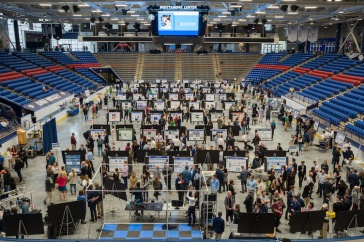
Editor’s note: This is one in a series we call “The Places They’ll Go” that has graduating seniors sharing their plans for the future.
?
Daniel DiRocco ’20 was always into biology. He goes so far as to say that he loved it. But chemistry — not so much. Until he took an organic chemistry class.
“That’s when I fell in love with it. And that inspired me to get a minor in chemistry and look for grad programs that combined chemistry and biology,” DiRocco says.
A biochemistry, molecular and cellular biology major at UNH, DiRocco is headed to the University of Michigan in September to pursue a Ph.D. in chemistry. His focus will be in biocatalysis, the study, use and engineering of enzymes for use in organic synthesis.?
As an undergraduate, DiRocco was a researcher in the lab of Estelle Hrabak, associate professor of molecular, cellular, and biomedical sciences. There he studied the effect that a protein called PP2A has on salt resistance in Arabidopsis thaliana, a small flowering plant native to Eurasia and Africa and a model plant organism.
“Think lab rat but for plants,” DiRocco says. “My work involved creating hybrid genes that would be inserted into PP2A mutant plants to try and fix their poor salt response.”
"I did miss the structure of attending classes physically, and regret not being able to close out my undergraduate career with my friends from UNH. But I have a lot to look forward to with grad school, so I think that? helped me stay focused and motivated to finish out my last semester and not dwell on the negatives.”
DiRocco presented his research on several occasions, including in 2018 at the annual meeting of the Association of Plant Biologists, where he won an award for best undergraduate poster presentation. He also participated in this year’s Undergraduate Research Conference, held virtually because of the coronavirus. ?
In 2018, DiRocco was awarded the Weeks Fellowship, a COLSA award for first-time researchers that allow?him to work on his research full time for 10 weeks. The following year he received a Summer Undergraduate Research Fellowship (SURF) from the Hamel Center.
His interest in biocatalysis is somewhat timely as pharmaceutical companies have begun to look to plants as a way to improve drug production.
“Biocatalysis is an emerging field that seeks to use enzymes, the proteins that catalyze the chemical reactions inside all living things, as reagents in the laboratory/industrial synthesis of drugs and other molecules,” DiRocco says. “Often times these molecules are very complicated and difficult to make, requiring expensive, toxic and environmentally harmful reagents to synthesize.
“Enzymes offer a great alternative to many of these reagents, as they are cheap, nontoxic, and are often far more efficient in the reactions they catalyze — no surprise given they have a few billion?years of evolution as a head start. Finding proper enzymes and tweaking them to work better or on a wider range of reactions is the key to getting it to work.”
DiRocco notes that while the University of Michigan has indicated it will reopen in the fall, he recognizes the situation is fluid. Having the last semester of his time at UNH end with remote classes has had its positives and negatives, he says.
“I normally have to commute over an hour each way to school, so it's been nice to take classes from the comfort of my home,” DiRocco says. “Still, I did?miss the structure of attending classes physically, and regret not being able to close out my undergraduate career with my friends from UNH. But I have a lot to look forward to with grad school, so I think that?helped me stay focused and motivated to finish out my last semester and not dwell on the negatives.”
-
Written By:
Jody Record ’95 | Communications and Public Affairs | jody.record@unh.edu



















































